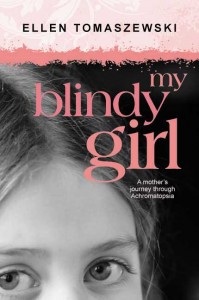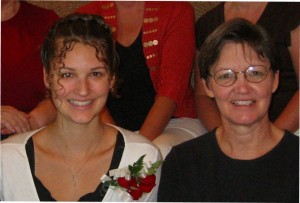 I am pleased to share the following interview with Ellen Tomaszewski, author of My Blindy Girl - A Mother's Journey Through Achromatopsia
I am pleased to share the following interview with Ellen Tomaszewski, author of My Blindy Girl - A Mother's Journey Through Achromatopsia![]() .
.
Please briefly introduce yourself and your family to our readers.
I'm an author, owner of a small publishing company, and mother of four grown daughters. My husband and I have been married thirty-four years now and spent 20 years as a presenting team for Catholic Engaged Encounter. I schooled children at home for ten years (mostly Katy) so I didn't start writing full time until five years ago. I feel called to write, and find it one of the most exciting, and interesting activities I can do. I love the whole process. I get enmeshed in the story, the words, the structure, the story arch, and even when it's frustrating or difficult, I enjoy writing. I've spent 21 years as a spiritual director with the Spiritual Exercises in Everyday Life.
 Please give an overview of My Blindy Girl - A Mother's Journey Through Achromatopsia
Please give an overview of My Blindy Girl - A Mother's Journey Through Achromatopsia![]() for those readers who are not familiar with the book.
for those readers who are not familiar with the book.
My Blindy Girl - A Mother's Journey Through Achromatopsia![]() is the story of an ordinary mother who, with God's help, learned how to do extraordinary things to help her visually impaired child and the rest of her family. When Katy was born, her eyes jiggled, bounced, crossed, and squinted. Doctors confirmed she was visually impaired and color blind. Worse, her IQ tests at half that of normal babies. Though devastated at first, her mother grew determined to find the cause and possibly cure. Set in the desert steppe of the Columbia River Valley in Washington State, My Blindy Girl braids a child's challenges, her mom's determination, and God’s grace into hope. It is a heart-warming, life-changing book, one you’ll not forget.
is the story of an ordinary mother who, with God's help, learned how to do extraordinary things to help her visually impaired child and the rest of her family. When Katy was born, her eyes jiggled, bounced, crossed, and squinted. Doctors confirmed she was visually impaired and color blind. Worse, her IQ tests at half that of normal babies. Though devastated at first, her mother grew determined to find the cause and possibly cure. Set in the desert steppe of the Columbia River Valley in Washington State, My Blindy Girl braids a child's challenges, her mom's determination, and God’s grace into hope. It is a heart-warming, life-changing book, one you’ll not forget.
When was your daughter Katy diagnosed with Achromatopsia and how did her condition impact upon your family?
Though I searched since her birth for a diagnosis, we didn't know the name of Katy's condition or her prognosis for the future until she was almost ten years old. As with most families with a disabled child, everyone was impacted by Katy's condition. To adjust, we changed so many little things that we had taken for granted before: how we spoke about things (didn't want to point out things she couldn't see), how we responded to negative comments, even how we watched television (oh, how great it would have been to have a large-screen TV then). My other daughters were often seeing-eye sisters, and home school was tailored to Katy's needs with hands-on activities and low-light rooms. Evening became the time of choice for playing outside and we read a lot of large print books. Mostly, my faith in God changed. I had to rely on God more for my energy, my determination, and the belief that God was with us, guiding us, leading us through. I had to trust that whatever happened, God could use that for good.
How did your Catholic faith help you through the difficulties associated with raising a daughter with site impairment issues?
First I had to learn to let go of my expectations about my child. I had to trust that God knew what God was doing when Katy was born visually impaired. That was hard for me. I took a lot for granted up to that point. I loved feeling in control. When we realized Katy had issues, I was forced to rethink. I had to live more fully the Gospel truths that before were just words. Through prayer and my involvement in Ignatian Spirituality, I learned how to discern God's will. That was vital as I tried to discover what God wanted us as a family to go. It was my hope that I wouldn't short-change our first three daughters and my husband for the sake of the child who needed so much time and attention. Prayer helped me keep that balance.
The sacraments helped too, especially the Eucharist. Jesus coming in flesh and blood (the incarnation) reminded me that God cares so much about me, he came to earth. I could look at Jesus and understand more how to suffer. I learned to appreciate more fully what St. Paul said about suffering: "To suffer in God's way means changing for the better and leaves no regrets. To suffer as the world knows suffering brings death." My faith taught me how to separate God's way of suffering from the world's way, and how, when I focused on God, my suffering could change me and our family for the better.
What prompted you to write the memoir and how has that process helped you personally?
I wrote the memoir because I wanted to celebrate what God has done for me and my family, to let people discover, as they read the story, that what St. Paul wrote to the Romans:"For we know that all things work together for good, for those who love the Lord." Life is so much more interesting and complex than just our own issues and experiences, and when we open our eyes, we begin to see more of how God can use whatever happens for good. It's miraculous and wonderful and when we pay attention, it changes us. I wanted to share that awe in the wonder of God's power.
 How does Katy feel about My Blindy Girl - A Mother's Journey Through Achromatopsia
How does Katy feel about My Blindy Girl - A Mother's Journey Through Achromatopsia![]() ?
?
Katy is a very open, transparent young woman. She read the book, of course, and gave me permission to tell the story (as did the rest of my family) before it was published. I think it helped her to understand her faith and her life, reading about her first ten years from her mother's point of view. Most of us don't get that opportunity - and she does see it as such.
What do you know now that you wish you would have known when you began this parenting journey?
I wish I had known how to relax and trust in God more, back when I was feeling stressed and anxious about things. I wish I could have understood that God was right there with me, supporting and protecting me. But on the other hand, as I worked through all that, I did learn. God has been good, and I know by experience, that prayer is the most important thing a person can do for any situation. It doesn't change God, of course, it changes us so we are ready to cooperate more fully with God.
Are there any additional comments you would like to share with our readers?
School and our culture tries to convince us that self-esteem is important. For example, if we're not good at handwriting, then we can rejoice in our soccer abilities. But in reality, our faith tells us that self-worth is what we must foster. And it has nothing to do with our abilities. We gain self-worth from God. We are worthwhile because God loves us. Period. Children with disabilities recognize that more readily than most. My daughter understood this very early. But when she was defined by what she could (or couldn't) do, she grew depressed and even suicidal. She just didn't measure up. We can do our children a great service by teaching them that God loves them no matter what, that all self-worth comes from God, not from any ability we have. If we learn that, disabilities become opportunities, and we learn the truth of St. Paul's words, "For those who love the Lord, all things work together for good."
The old adage says, "when I see it I'll believe it." But Ignatius of Loyola observed that vision often dictates perception. He said, "When I believe it, I'll see it." And this can be extended to: "Love looks for what is loveable and finds it." Because of my daughter, I have learned to see life in a new way, to discover hidden depths of my Catholic faith and live them more fully. I was forced to look for what is lovable and find it in a disability, in difficulty, in imperfection. And I had the great opportunity to pass that on to the next generation. It has been a great gift for us all.
Purchase My Blindy Girl - A Mother's Journey Through Achromatopsia![]() and support CatholicMom.com.
and support CatholicMom.com.
About the Author

Lisa M. Hendey
Lisa M. Hendey is the founder of CatholicMom.com, a bestselling author and an international speaker. A frequent radio and television guest, Hendey travels internationally giving workshops on faith, family, and communications. Visit Lisa at LisaHendey.com, on her Substack at LisaHendey.Substack.com, or on social media @LisaHendey for information on her speaking schedule or to invite her to visit your group, parish, school or organization. Find Lisa’s books on her Amazon author page.


.png?width=1806&height=731&name=CatholicMom_hcfm_logo1_pos_871c_2728c%20(002).png)
Comments